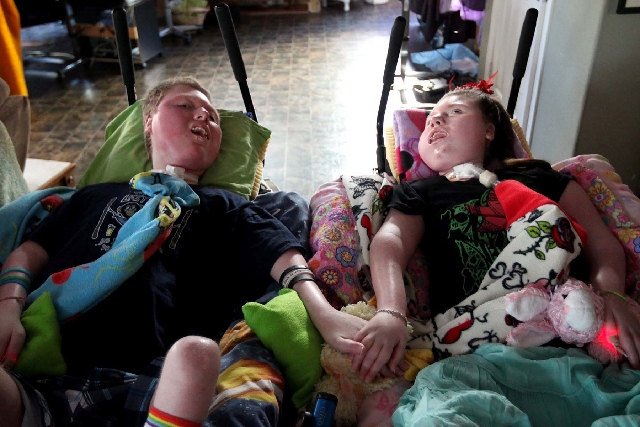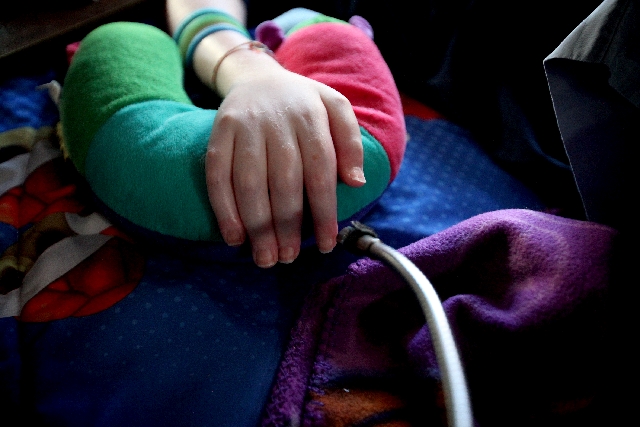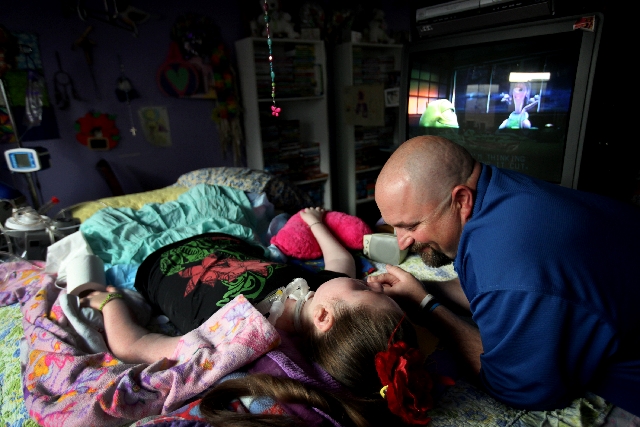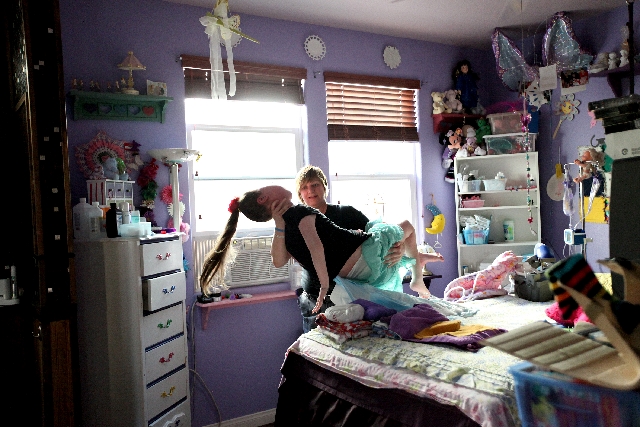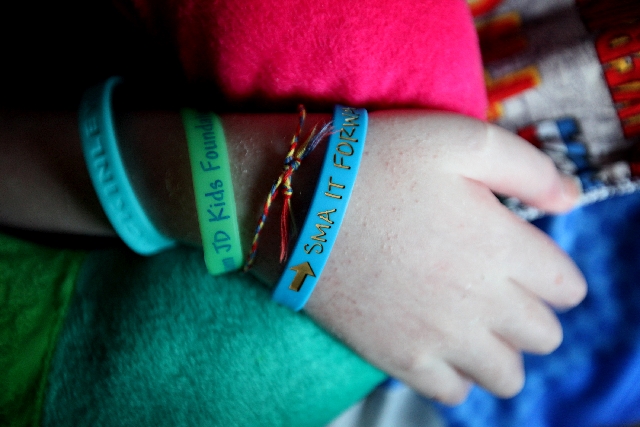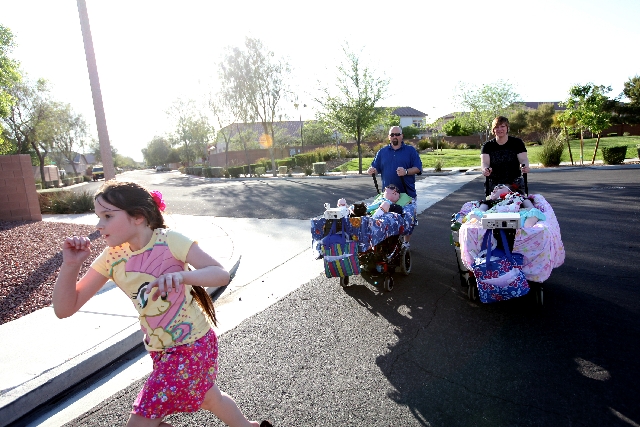Brother shares sister’s challenges along with their faith, hopes
Cashel Gardner’s right index finger moves slightly, with easy-to-miss subtlety but unmistakable purpose.
That’s huge, because Cashel’s right index finger, along with the thumb on his left hand, are the always-smiling 16-year-old’s connections to the world.
Cashel and his sister, Allie — she’s the cute 14-year-old lying in her own bed a few feet away — have spinal muscular atrophy, a genetic condition that has robbed them of their ability to use their own muscles.
They can’t breathe on their own. Can’t swallow on their own. Can’t sit up on their own or walk. So, they spend their days lying in their beds, watching what goes on around them with eyes that take in everything.
But Cashel can move his right index finger and his left thumb. With them, he can control the cursor on a computer screen.
And when Cashel works his finger and thumb, magic happens.
With his finger and thumb, Cashel maintains a Facebook page and a website on which he shares stories of himself, Allie and his family.
With his finger and thumb, Cashel corresponds with people all over the planet — others who have SMA, their parents and family members, legions of supporters and friends — and has created a network of people who, like he and his sister, otherwise would live their lives in greater isolation.
With his finger and thumb, Cashel composes and sends to others daily messages of congratulations, encouragement, inspiration, support and, when the need arises, sympathy.
The physical world of Cashel and Allie is pretty much circumscribed by the walls of their home.
But, with that right index finger and that left thumb, Cashel is everywhere.
■ ■ ■
Cashel and Allie’s mother, Sandy Gardner, and her former husband, Brandon Gardner, didn’t know they were carriers of the gene that causes SMA until Cashel was born.
SMA results when a gene responsible for the manufacture of proteins vital to the development of motor neurons is abnormal or missing. That causes neurons in the spinal cord to degenerate, blocking messages from the brain and causing muscles to waste away.
According to Sandy, SMA occurs in about 1 in 6,000 births, and about 1 in 40 people are carriers (although both parents must be carriers for SMA to occur). Cashel and Allie have Type 1 SMA, the most severe form of the disease.
Dr. Blair Duddy, the siblings’ pediatrician for nearly all of their lives, says about 95 percent of children with Type 1 SMA die by the age of 2. There is no cure for SMA, and treating the disease requires managing the array of serious medical conditions — heart and lung problems, fragile bones, scoliosis that can affect lung function — that can be associated with it.
However, treatment philosophies vary. One is “that we are just going to love them until they pass away, whenever that is,” Duddy says. “The other is to do the full-court technology, so if they can’t breathe on their own, (order) the tracheostomy and home ventilation, and if they can’t eat, they have the gastric tubes.”
Sandra and Brandon opted for the latter approach. Because the muscles that control their breathing no longer are strong enough to work, Cashel and Allie have spent almost all of their lives on ventilators that force air into tracheostomies on their necks.
Because the muscles that allow them to swallow no longer work, Cashel and Allie are fed through gastric tubes inserted in their abdomens. Baby food mixed with juice is a typical meal.
And because the muscles that would allow them to sit up, stand and walk never had a chance to develop, the teenagers spend their days in bed or in reclinerlike wheelchairs.
Sandy recalls that when Cashel was diagnosed with SMA at about 6 months old, doctors hinted that, rather than taking measures to prolong his life, she might wish to let things simply take their course.
The advice “went in this ear and out of the other,” Sandy says. Brandon says he’s not even sure it was a decision.
“It’s what you do,” he explains. “You love them.”
By the time he was 18 months old, Cashel’s ability to breathe had worsened, so he was given a tracheostomy — albeit one that still allows him to vocalize — and put on a ventilator. Not long after the procedure, when Cashel awoke in his hospital room, he discovered that, for the first time, he had enough wind to yell out a word.
“It was the word ‘love,’ and he yelled it like he never yelled it before,” Sandy recalls. “ ‘Love. Love. Love.’ He was on the ventilator, and I think he even surprised himself, like, ‘That never came out of me before.’
“I remember praying: ‘God, did I make the right choice? Am I doing what’s right?’ And for him to be waking up and yelling ‘love,’ I’m like, ‘Thank you, God, for telling me.’ And we never looked back.”
A few years later, Sandy and Brandon had Allie.
“We were using protection. We were using condoms,” Sandy says. “And to get pregnant with her in that way to me is, like, God wants me to have this child.”
Doctors suggested that Sandy undergo amniocentesis to see whether Allie, too, would be born with SMA. “But I thought, ‘It doesn’t matter if she’s born with it or not born with it. It’s not going to change anything.’ ”
“It didn’t really matter,” Brandon agrees. “Like, we’d ask God to save Cashel and then go and take her life?”
“It’s your family,” Brandon says. “You care for them. Bottom line.”
When Allie was born, Sandy and Brandon were delighted to find that “she could move, she could yell, she could even roll over,” Sandy says. “We were certain she didn’t have it. No way did she have it.”
But by the time she was 8 weeks old, Allie “was barely moving her arms, so we knew right then,” Sandy says. Allie had a tracheostomy and was put on a ventilator when she was 7 months old.
Sandy stays home to care for Cashel and Allie. A teacher visits the home to work with the teenagers, while Sandy home schools youngest daughter Emily, 8, who doesn’t have SMA. She is Sandy’s child with husband Matt Barber.
The family considers themselves blessed that Brandon’s insurance (he works as an information technology head for a home construction company) and Medicaid cover most of Cashel and Allie’s medical costs. Prescription medications alone amount to about $15,000 a month, Sandy notes.
Sandy says the end of her marriage to Brandon came not because of anything specific. “Our whole life turned toward them, and we just became like brother and sister.”
“I think it’s just part of God’s plan,” she adds, noting that Brandon and Matt “are like best friends. They didn’t know each other before. But we all work together.”
As primary caregiver, Sandy has learned to routinely perform such medical tasks as maintaining her children’s tracheostomies, clearing their mouths of saliva, operating the machine that helps to keep mucus from settling in their lungs and monitoring their medical equipment.
Caring for two teenagers with SMA is “very hard,” Duddy says, and Sandy “is very devoted.”
To others, it might seem like a lot, Sandy concedes. “But, to me, it’s just normal.”
■ ■ ■
When you enter the family’s home, you immediately notice the unsettling drone of Cashel and Allie’s ventilators. Yet, it’s amazing how, after awhile, even a ventilator alarm that kicks off once in awhile becomes barely noticed white noise.
More compelling — more in sync with the cozy, homey vibe the family has created — are the sorts of sounds you’d hear in any other home on any other weekday evening.
Video game sound effects (Cashel’s a wiz). Pat and Vanna on “Wheel of Fortune.” Matt’s soft murmurs to Allie as he lowers his head close to hers and strokes her cheek. Sandy’s teasing give and take with Cashel. Emily talking to Loki, one of the family cats, as she balances the animal in her lap (he’s the laid-back one, “kind of like a little service cat,” Emily explains; their other is a Siamese named Po).
Cashel’s and Allie’s beds are separated by just a few feet in the living room, which has been remodeled to eliminate doors, sharp angles and obstructions, making the beds visible and quickly accessible from just about anywhere.
The vivid purple walls of Allie’s bedroom are plastered with posters, sports pennants (the Vikings and the Steelers), objects in a butterfly theme and a serious collection of souvenir spoons on wooden shelves. Cashel’s room is heavy on posters (most of them, as in Allie’s room, facing down from the ceiling), a bookshelf filled with DVDs and framed photos of friends.
Cashel and Allie lie on their beds, TVs and computer monitors positioned next to them. But if SMA has limited their ability to move, don’t think for a minute that they have been silenced.
When a guest says something silly to Allie, the girl seems to barely change her expression. But Sandy laughs.
“Oh, she’s giggling,” Sandy explains, pointing out a tiny dimple that appears on the left side of Allie’s mouth. “See? That’s her smile.”
Cashel is always smiling, but he, too, has a few nonverbal communication tricks. When Sandy asks him to demonstrate “yes,” Cashel moves his eyebrows up and down. And his “no”? It’s subtle, too, but nobody will ever mistake the scowl for a “yes.”
It’s obvious that the siblings are tight. Sandy says Emily has been known to sneak out of bed for late-night video-gaming sessions with Cashel, and it’s a supportive Emily who’s the first to offer a guest a handful of Cashel’s “SMA It Forward with Cashel” wristbands, urging him to hand them out to people he knows.
Via an email interview, Cashel writes that, while Allie isn’t as outgoing as he is, he’d like for people to get to know her, too.
“She can’t talk or write like I can but she loves to go out,” Cashel writes. “She loves getting tickled and kisses. Allie loves music and dancing. Celine Dion is one of her favorites.
“If I could have one wish, it would be for her, for her to be able to sing and dance like all the pretty girls she watches on TV. She is just the sweetest girl to everyone. Allie and Emily are the greatest sisters a guy could ask for.”
Also visiting today is Cashel’s friend, Jake Stoehr. Jake lives across the street and met Cashel in 2003 at a Fourth of July party.
Since then, Jake has stopped by every weekend, and on many weekdays, to play video games and hang out with Cashel.
“He’s grown up here,” Sandy says. “He’s like my son.”
Only problem is, Jake soon will be leaving on a church mission and he doesn’t know whether he will be able to keep in touch with Cashel via email.
“I’ll be in the Philippines, so I don’t know how (the Internet) is over there,” Jake says.
■ ■ ■
As welcoming and as warm as it is, their home makes up most of Cashel and Allie’s entire physical world.
Whenever possible, Duddy and other doctors and medical specialists care for the teens at their home. But whenever a trip — to church, social gatherings, a doctor appointment — is necessary, it must be planned by the three parents like a military operation.
While the family has a handicap van — an older one, with less mechanical reliability than they’d prefer — it can transport only one child at a time. And whenever a child does leave the house, the packing effort must include making room for spares of mechanical and medical equipment — ventilator hoses and such — that always must be handy.
That’s why the family is trying to raise money to purchase a newer, more reliable, more spacious handicap van for Cashel and Allie. They’ve so far raised close to $13,000 toward its estimated $70,000 cost through an online campaign ( gofundme.com/HandicapVan4TheGardners). A benefit golf tournament also has been scheduled for June 1 at Silverstone Golf Club ( silverstonegolf.com/tournament-registration or call 702-658-9468 or 702-497-1098).
Sandy has noticed that, now that they are teenagers, Cashel and Allie want to see more of the world outside their living room.
“We’re very blessed with our home, but we don’t have the means to be able to get a van that would fit both of them,” she says.
Where would Cashel most like to go? “We really want to be able to go to church on the weekend,” he writes. “Of course we need a van to get to doctors’ appointments, but we want a van so we can just go to the park or a store — things other teenagers do.
“We live here in Las Vegas with so much to see, too. Our dream is to be able to go to California. We would love to go to Disneyland and see the ocean, too.”
In addition to raising money for a new van, and as important to the family as that is, Cashel has found a way to put the Internet skills to even greater use: Through his Facebook page ( facebook.com/SMAItForwardWithCashel) and website ( SMAItForward.com) Cashel has unveiled his “SMA It Forward” campaign, through which he hopes to raise awareness of SMA.
Cashel so far has connected with people in more than 70 countries, Matt says. “We used to have a map of places, but it got so big so fast, I couldn’t keep up.”
Among his best, and more famous, friends are magician Criss Angel and actor Josh Duhamel, who regularly correspond with Cashel and his family via online videos and messages.
Through his Facebook and Web pages, and with the help of that always busy finger and thumb, Cashel has created a worldwide community of SMA patients and their families. Every day, he writes messages of greetings, congratulations, encouragement, advice and support to people who otherwise might never have known one another.
When he began his online efforts, “I hoped I could reach other SMA families and newly diagnosed families to show them that their child does have a chance to live and could have a great life,” Cashel writes.
But, he continues, “what I was surprised by was how many other SMA families are so helpful and supportive, too, and that they were so thankful that me, a 15-year-old kid, was (reaching) so many and making a difference. The other thing that surprised me was, the people who do not have a child or even knew about SMA were so caring and supportive, too.”
Cashel and his family also have posted several videos to YouTube, and Cashel’s knack for navigating the Internet even led him to participate last year in a live video conference about assistive technology with a group of University of Nevada, Las Vegas grad students.
Sandy admits she was amazed to see how easily Cashel cracked jokes and interacted with the students.
■ ■ ■
How does he remain so upbeat?
“I keep so upbeat because it is like a 24/7 comedy club around our house,” he writes. “I am just a generally happy person, too, so I just don’t have bad days. I think it has a lot to do with my parents and friends, they are all happy and positive, I never have had any negative people around me. My mom always looks for the bright side of things. I think life is like a game: You just gotta have fun with it and not take things too seriously.”
Cashel’s notes are well-written, sincere and witty, and many include spiritual references. He says he’d someday like to be an inspirational speaker and a writer.
“In fact, I started writing stories at a young age and my teacher and I used to edit them as schoolwork,” he says.
“I love writing, I have just been so busy with my page the last year, I haven’t done much storywise,” he continues.
“My mom and I are working on a fiction story based on the adventures of a kid like me and his best friend that get a magic (computer) mouse, and it transports them into other worlds (where) he is regular and fights evil.”
Does he ever wish that things could be, well, different?
“No, because I don’t think I would be the same person without SMA,” Cashel answers. “I believe God made me exactly the way he needed me to be for the job he has for me here on Earth. But what scares me the most is if I was a regular teenager, would I even know about God?
“And I have said this before: What teenager wouldn’t like to just hang out and play on the computer and video games all the time?”
You just know he was smiling when he wrote it.
Contact reporter John Przybys at jprzybys@reviewjournal.com or 702-383-0280.



